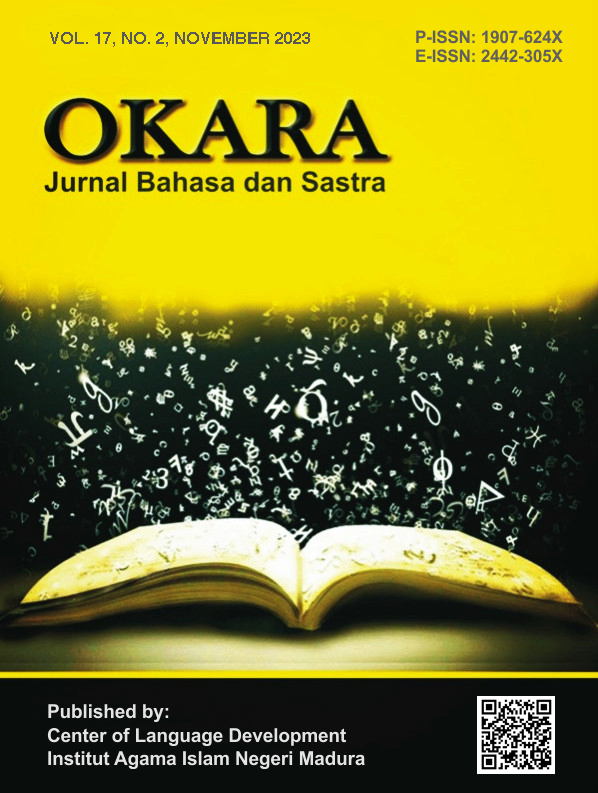On Michel Foucault: Power/Knowledge, Discourse, and Subjectivity
 Abstract views: 1966
,
Abstract views: 1966
,
 PDF downloads: 2361
PDF downloads: 2361
Abstract
The indubitable significance of Michel Foucault within the realm of modern humanities cannot be overstated. His far-reaching influence across various fields of study has proven to be of paramount importance. The present study is intended to bring into focus the most consequential critical concepts of Michel Foucault. While certain scholars have previously endeavoured to depict and reconceptualise Foucault's principal notions, many of them have tended to complicate the matter by problematising his understanding of these concepts. The most significant concepts include Discourse, Power, Knowledge, and Subjectivity. The nature and function of discourses in shaping knowledge and the relationship between knowledge and power have been subject to investigation. Additionally, this study sheds light on the manner in which subjects are shaped in the duality of power and resistance. The primary objective of this study is to offer a lucid definition of these terms and their interrelatedness.
Downloads
References
Allen, A. (2002). Power, Subjectivity, and Agency: Between Arendt and Foucault. International Journal of Philosophical Studies, 10(2), 131–149. https://doi.org/10.1080/09672550210121432
Berard, T. J. (1999). Michel Foucault, The History of Sexuality, and the Reformulation of Social Theory. Journal for the Theory of Social Behaviour, 29(3), 203–227. https://doi.org/10.1111/1468-5914.00099
Bogard, W. (1991). Discipline and Deterrence: Rethinking Foucault on the Question of Power in Contemporary Society. The Social Science Journal, 28(3), 325–346. https://doi.org/10.1016/0362-3319(91)90017-X
Caluya, G. (2010). The Post-Panoptic Society? Reassessing Foucault in Surveillance Studies. Social Identities, 16(5), 621–633. https://doi.org/10.1080/13504630.2010.509565
Deacon, R. (1998). Strategies of Governance Michel Foucault on Power. Theoria: A Journal of Social and Political Theory, (92), 113–148.
Feldman, S. P. (1997). The Revolt Against Cultural Authority: Power/Knowledge as an Assumption in Organization Theory. Human Relations, 50(8), 937–955. https://doi.org/10.1177/001872679705000804
Fiske, J., & Hancock, B. H. (2016). Power Plays Power Works (1st edition). London: Routledge.
Flohr, M. (2016). Regicide and Resistance: Foucault’s Reconceptualization of Power. Distinktion: Journal of Social Theory, 17(1), 38–56. https://doi.org/10.1080/1600910X.2016.1145590
Foucault, M. (1980). Power/Knowledge: Selected Interviews and Other Writings, 1972-1977 (First Edition; C. Gordon, Trans.). Amsterdam: Adfo Books.
Foucault, M. (1984). The Foucault Reader (P. Rabinow, Ed.). New York: Pantheon.
Foucault, M. (1990). The History of Sexuality, Vol. 1: An Introduction (Reissue edition). New York: Vintage.
Foucault, M. (2009). Discipline & Punish: The Birth of the Prison (A. Sheridan, Trans.). New York: Vintage Books.
Foucault, M. (2010). The Archaeology of Knowledge: And the Discourse on Language (First Edition; A. Sheridan-Smith, Trans.). New York: Vintage.
Halperin, D. M. (1998). Forgetting Foucault: Acts, Identities, and the History of Sexuality. Representations, (63), 93–120. https://doi.org/10.2307/2902919
Hancock, B. H. (2018). Michel Foucault and the Problematics of Power: Theorizing DTCA and Medicalized Subjectivity. The Journal of Medicine and Philosophy: A Forum for Bioethics and Philosophy of Medicine, 43(4), 439–468. https://doi.org/10.1093/jmp/jhy010
Hardy, N. (2015). The Contingencies of Power: Reformulating Foucault. Journal of Political Power, 8(3), 411–429. https://doi.org/10.1080/2158379X.2015.1099210
Howarth, D. (2002). An Archaeology of Political Discourse? Evaluating Michel Foucault’s Explanation and Critique of Ideology. Political Studies, 50(1), 117–135. https://doi.org/10.1111/1467-9248.00362
Kelly, M. G. E. (2010). The Political Philosophy of Michel Foucault (1st edition). London: Routledge.
Koopman, C. (2010). Revising Foucault: The History and Critique of Modernity. Philosophy & Social Criticism, 36(5), 545–565. https://doi.org/10.1177/0191453710363576
Luxon, N. (2008). Ethics and Subjectivity: Practices of Self-Governance in the Late Lectures of Michel Foucault. Political Theory, 36(3), 377–402. https://doi.org/10.1177/0090591708315143
Manias, E., & Street, A. (2000). Possibilities for Critical Social Theory and Foucault’s Work: A Toolbox Approach. Nursing Inquiry, 7(1), 50–60. https://doi.org/10.1046/j.1440-1800.2000.00048.x
Manokha, I. (2009). Foucault’s Concept of Power and the Global Discourse of Human Rights. Global Society, 23(4), 429–452. https://doi.org/10.1080/13600820903198792
Midelfort, H. C. E. (1990). Comment on Colin Gordon. History of the Human Sciences, 3(1), 41–45. https://doi.org/10.1177/095269519000300106
Mills, S. (2003). Michel Foucault. London: Psychology Press.
Nietzsche, F. (2017). On The Genealogy of Morals. Independently Published.
O′Farrell, C. (2005). Michel Foucault (First Edition). London ; Thousand Oaks, Calif: SAGE Publications Ltd.
Olssen, M. (2004). Foucault and Marxism: Rewriting the Theory of Historical Materialism. Policy Futures in Education, 2(3–4), 454–482. https://doi.org/10.2304/pfie.2004.2.3.3
Racevskis, K. (2005). Edward Said and Michel Foucault: Affinities and Dissonances. Research in African Literatures, 36(3), 83–97.
Smart, B. (2002). Michel Foucault (2nd edition). London: Routledge.
Wandel, T. (2001). The Power of Discourse: Michel Foucault and Critical Theory. Journal for Cultural Research, 5:3, 368–382, https://doi.org/10.1080/14797580109367237
The journal operates an Open Access policy under a Creative Commons Attribution-NonCommercial 4.0 International License. Authors who publish with this journal agree to the following terms:
- Authors retain copyright and grant the journal right of first publication with the work simultaneously licensed under a Creative Commons Attribution License that allows others to share the work with an acknowledgement of the work's authorship and initial publication in this journal.
- Authors are able to enter into separate, additional contractual arrangements for the non-exclusive distribution of the journal's published version of the work (e.g., post it to an institutional repository or publish it in a book), with an acknowledgement of its initial publication in this journal.
- Authors are permitted and encouraged to post their work online (e.g., in institutional repositories or on their website) prior to and during the submission process, as it can lead to productive exchanges, as well as earlier and greater citation of published work.





_(1).png)
.png)
.png)
1.png)
.png)
.png)

.png)
_-_Copy_-_Copy.png)





